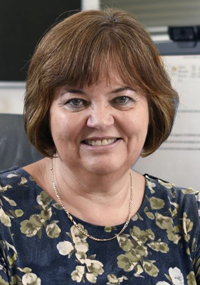SCOR: Specialized Center of Research
What it is.
The innovative SCOR program funds teams of researchers from one or several institutions to engage in collaborative efforts to develop a focused research program, foster new interactions and cooperation, and enhance interdisciplinary research among the participants in order to discover new approaches to treating patients with blood cancers.
What it does.
The SCOR program brings together distinguished investigators with a deep understanding of the complexity of blood cancers and their treatments. The teams are uniquely positioned to undertake groundbreaking research. The work seeks to to develop innovative approaches for the treatment, diagnosis or prevention of hematological malignancies.

John L. Cleveland, PhD, Associate Center Director of Basic Science
H. Lee Moffitt Cancer Center & Research Institute
"Myelodysplastic syndromes (MDS) are a genetically diverse group of disorders that are caused by chronic inflammation in the bone marrow. This inflammatory state ultimately leads to failures in the production of blood cells and to leukemia. With the support of The Leukemia and Lymphoma Society, investigators from the Moffitt Cancer Center and the Memorial Sloan Kettering Cancer Center have joined forces to develop new interventions and therapeutic strategies that can be used to prevent and cure MDS."

Helen E. Heslop, M.D., DSc (Hon)
Baylor College of Medicine
"Using a new Specialized Center of Research (SCOR) grant from The Leukemia and Lymphoma Society, our team will work to develop more widely applicable targeted cellular therapies for leukemia and lymphoma. The results we’ve seen so far using T cell therapy is very encouraging, and while we hope these therapies can alleviate the need for bone marrow transplantation, extending this success to other blood cancers has been challenging for many reasons. Our overall goal of this SCOR is to extend our past successes in developing targeted cellular therapies so that these effective treatments can become standard of care for the broadest possible range of blood cancers."

Craig T. Jordan, Ph.D.
University of Colorado
"Our work in acute myeloid leukemia (AML) could change the way clinicians think about this disease. Outcomes in AML are dismal, and the standard treatments have major side effects affecting quality of life. We believe the lack of progress in AML is because we have been attacking leukemia cells when we should be concentrating on the root of the disease - leukemia stem cells. This research award will allow us to investigate the least toxic, most effective ways of killing AML stem cells including the development of new drugs and combination therapies."
FY20 Grant Recipients
Carl June, MD
University of Pennsylvania
"Pan-heme" CAR: Anti-CD38 CAR T cells for myeloid, lymphoid and plasma cell malignancies
Jonathan Licht, MBBS
University of Florida
Targeting Enhancer Dysfunction in Hematological Malignancy
Madhav Dhodapkar, MD
Emory University
Improving targeted adoptive cell therapy of myeloma